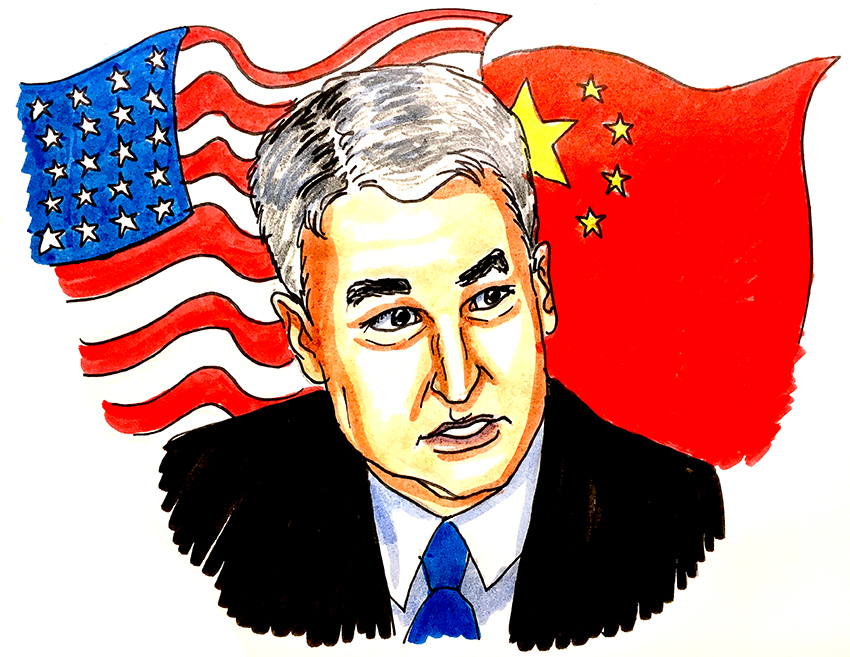Russia hacked into American energy facilities and attempted to infiltrate states’ voting systems in the 2016 election.
While many see Russia’s bold attacks as the face of a national security dilemma, few know that China stands poised to strengthen its covert influence operations within the United States. China runs state-funded cultural, historical and lingual learning centers called Confucius Institutes. These centers operate on over 100 university campuses in the U.S., including University of Texas institutions.
Two UT schools — UT-Dallas and UT-San Antonio — have Confucius Institutes. These institutes state that they promote Chinese language, cultural appreciation and historical understanding. However, this masks their ulterior motives: to disseminate propaganda, enforce censorship and build Chinese Communist influence overseas.
The UT System has potentially compromised our academic integrity through this partnership.
Confucius Institutes link back to Hanban, a division of China’s Ministry of Education directly overseen by the executive heads of 12 Chinese ministries. These include the state media and propaganda arm as well as China’s Ministry of Foreign Affairs.
This might explain why Confucius Institute curricula and professors get screened and vetted for Chinese government approval. In effect, universities with Confucius Institutes concede academic control to China.
If we don’t let the Department of Education screen UT courses and professors, we shouldn’t let the Chinese Ministry of Education veto certain courses, choose textbooks and vet professors at Chinese institutes on our university campuses.
Joshua Busby, an associate professor at Lyndon B. Johnson School of Public Affairs and distinguished scholar at the Strauss Center, wrote in an email that “there are legitimate fears that the Confucius Institute, given Chinese government support, might be an avenue for limiting wider communication of themes and ideas” that the Chinese do not want to discuss.
Free inquiry and intellectual independence remain central to the purpose of higher education. Confucius Institutes undermine both by teaching topics such as the “One China” policy — which argues that Taiwan is not independent from mainland China — and by avoiding unfavorable topics such as Tibet’s contentious history with China. Hanban also prohibits the instruction or discussion of the Dalai Lama, the Tiananmen Square massacre, or dissident Liu Xiaobo.
J. Paul Pope, an LBJ school professor and senior fellow at the Intelligence Studies Project, wrote in an email that “Chinese involvement and funding for these institutes represents, at minimum, a conflict of interest with the objectives and values of a university” and its academic freedom. Pope said that at their worst, Confucius Institutes represent an avenue for China to secure intellectual property with or without rightful compensation. They represent a way in which the Chinese government can obtain easy cover for espionage or gather intelligence on students that even the U.S. government cannot. Pope wrote that universities “specifically should not allow these institutes on their campuses.”
Limiting scholarship while broadening foreign government intelligence contrasts with American values and national interests.
Many government officials have sounded the alarm on Confucius Institutes from both sides of the aisle, including U.S. Reps. Michael McCaul and Henry Cuellar, U.S. Sen. Ted Cruz, U.S. Sen. Marco Rubio and FBI Director Christopher Wray.
The 2019 National Defense Authorization Act, signed by the president Aug. 13, prohibits Pentagon resources from all Confucius Institute programs.
Fostering a positive relationship with China and learning Chinese language and culture should be top priorities. But Confucius Institutes are not the ways we accomplish this.
A March 2018 joint letter from Reps. Michael McCaul and Henry Cuellar said in part that Confucius Institutes “are a threat to our nation’s security by serving as a platform for China’s intelligence collection and political agenda.”
As a result of this letter, the Texas A&M System cut ties with its two Confucius Institutes the next month.
It’s time the UT System follow suit.
Verses is an environmental engineering and Plan II sophomore from San Antonio.





















